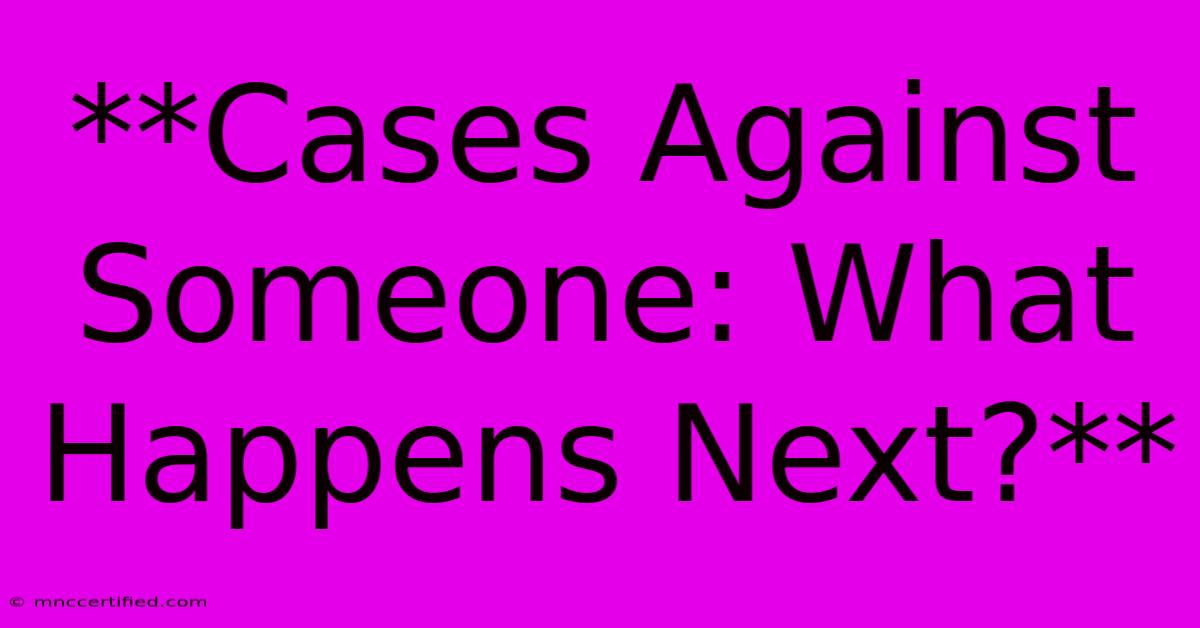**Cases Against Someone: What Happens Next?**
You need 3 min read
Post on Nov 07, 2024

**Cases Against Someone: What Happens Next?**
Table of Contents
Cases Against Someone: What Happens Next?
Being accused of a crime can be a frightening and confusing experience. Understanding the legal process can help you navigate this difficult situation. This article will outline the general steps involved in a criminal case, from the initial arrest to a potential trial.
1. Arrest and Booking
- The Initial Stage: If the police have probable cause to believe you have committed a crime, they can arrest you. This means they have enough evidence to suggest that you are likely guilty.
- Booking: After your arrest, you will be taken to a police station where you'll be "booked." This involves recording your personal information, taking your fingerprints and mugshot, and formally charging you with the crime.
2. Initial Appearance and Bail
- First Court Appearance: Within a short period after your arrest, you'll have your initial appearance in court. Here, you'll be informed of the charges against you, and the judge will set bail.
- Bail: Bail is a sum of money used to ensure that you'll appear for future court dates. If you can't afford bail, you may be held in jail until your trial.
3. Discovery
- Information Gathering: Both the prosecution (the government) and the defense (your lawyer) have the right to gather information about the case. This process is called discovery.
- Exchange of Evidence: The prosecution must provide the defense with all evidence they have against you. The defense can also request information from the prosecution.
4. Plea Negotiations
- Potential Agreement: Before trial, the prosecution and defense may engage in plea negotiations. This is an attempt to reach an agreement where you plead guilty to a lesser charge or to a reduced sentence.
- Not Guilty Plea: If no plea deal is reached, you'll enter a plea of "not guilty" and the case will proceed to trial.
5. Trial
- Jury Selection: If you plead not guilty, the case will go to trial. A jury will be selected to hear the evidence and determine whether you're guilty or not guilty.
- Presenting Evidence: Both the prosecution and the defense will present their evidence to the jury. This may include witness testimony, physical evidence, and expert opinions.
- Verdict: After hearing the evidence, the jury will deliberate and reach a verdict. If found guilty, you'll be sentenced.
6. Sentencing
- Judge's Decision: The judge will determine the sentence based on the severity of the crime, your criminal history, and other factors.
- Potential Consequences: Possible consequences include imprisonment, probation, fines, or a combination of these.
7. Appeals
- Challenging the Verdict: If you're found guilty, you have the right to appeal the verdict. This means you're asking a higher court to review the decision and possibly overturn it.
Important Considerations
- Right to Counsel: You have the right to an attorney throughout the entire legal process. If you cannot afford an attorney, the court will appoint one for you.
- Presumption of Innocence: You are presumed innocent until proven guilty. The burden of proof is on the prosecution to prove your guilt beyond a reasonable doubt.
- Legal Advice: It is crucial to seek legal advice from an experienced criminal defense attorney. They can provide guidance and representation throughout the legal process.
Please note: The legal process can vary depending on the jurisdiction and the specific charges you face. This article is intended to provide a general overview and should not be considered legal advice. Consult with a qualified attorney for specific legal guidance.

**Cases Against Someone: What Happens Next?**
Thank you for visiting our website wich cover about **Cases Against Someone: What Happens Next?**. We hope the information provided has been useful to you. Feel free to contact us if you have any questions or need further assistance. See you next time and dont miss to bookmark.
Featured Posts
-
Back To The City Strongest Investment King
Nov 07, 2024
-
Leeds United Ahead Of Den Clash Millwall Praise
Nov 07, 2024
-
Fc Barcelona Dominates Estrella Roja 2 5
Nov 07, 2024
-
Wells Insurance Wilmington North Carolina
Nov 07, 2024
-
Championship Leeds Draw 0 0 At Millwall
Nov 07, 2024